Chaoyi Ma
OpenOneRec Technical Report
Dec 31, 2025Abstract:While the OneRec series has successfully unified the fragmented recommendation pipeline into an end-to-end generative framework, a significant gap remains between recommendation systems and general intelligence. Constrained by isolated data, they operate as domain specialists-proficient in pattern matching but lacking world knowledge, reasoning capabilities, and instruction following. This limitation is further compounded by the lack of a holistic benchmark to evaluate such integrated capabilities. To address this, our contributions are: 1) RecIF Bench & Open Data: We propose RecIF-Bench, a holistic benchmark covering 8 diverse tasks that thoroughly evaluate capabilities from fundamental prediction to complex reasoning. Concurrently, we release a massive training dataset comprising 96 million interactions from 160,000 users to facilitate reproducible research. 2) Framework & Scaling: To ensure full reproducibility, we open-source our comprehensive training pipeline, encompassing data processing, co-pretraining, and post-training. Leveraging this framework, we demonstrate that recommendation capabilities can scale predictably while mitigating catastrophic forgetting of general knowledge. 3) OneRec-Foundation: We release OneRec Foundation (1.7B and 8B), a family of models establishing new state-of-the-art (SOTA) results across all tasks in RecIF-Bench. Furthermore, when transferred to the Amazon benchmark, our models surpass the strongest baselines with an average 26.8% improvement in Recall@10 across 10 diverse datasets (Figure 1). This work marks a step towards building truly intelligent recommender systems. Nonetheless, realizing this vision presents significant technical and theoretical challenges, highlighting the need for broader research engagement in this promising direction.
OneRec-V2 Technical Report
Aug 28, 2025



Abstract:Recent breakthroughs in generative AI have transformed recommender systems through end-to-end generation. OneRec reformulates recommendation as an autoregressive generation task, achieving high Model FLOPs Utilization. While OneRec-V1 has shown significant empirical success in real-world deployment, two critical challenges hinder its scalability and performance: (1) inefficient computational allocation where 97.66% of resources are consumed by sequence encoding rather than generation, and (2) limitations in reinforcement learning relying solely on reward models. To address these challenges, we propose OneRec-V2, featuring: (1) Lazy Decoder-Only Architecture: Eliminates encoder bottlenecks, reducing total computation by 94% and training resources by 90%, enabling successful scaling to 8B parameters. (2) Preference Alignment with Real-World User Interactions: Incorporates Duration-Aware Reward Shaping and Adaptive Ratio Clipping to better align with user preferences using real-world feedback. Extensive A/B tests on Kuaishou demonstrate OneRec-V2's effectiveness, improving App Stay Time by 0.467%/0.741% while balancing multi-objective recommendations. This work advances generative recommendation scalability and alignment with real-world feedback, representing a step forward in the development of end-to-end recommender systems.
OneRec Technical Report
Jun 16, 2025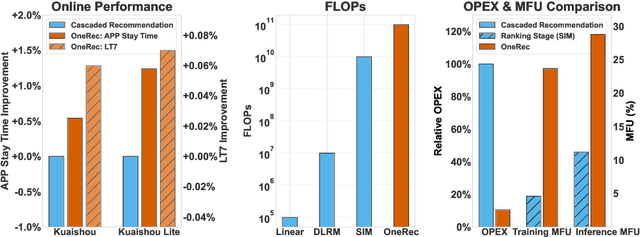

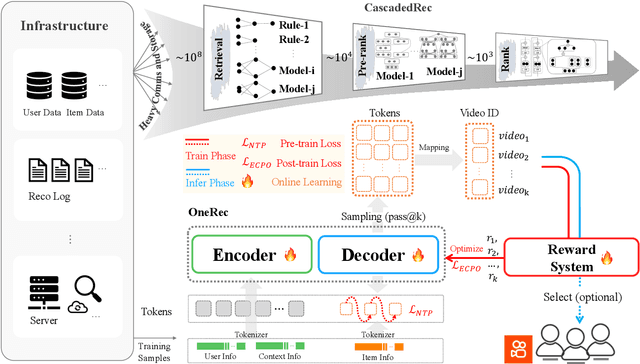

Abstract:Recommender systems have been widely used in various large-scale user-oriented platforms for many years. However, compared to the rapid developments in the AI community, recommendation systems have not achieved a breakthrough in recent years. For instance, they still rely on a multi-stage cascaded architecture rather than an end-to-end approach, leading to computational fragmentation and optimization inconsistencies, and hindering the effective application of key breakthrough technologies from the AI community in recommendation scenarios. To address these issues, we propose OneRec, which reshapes the recommendation system through an end-to-end generative approach and achieves promising results. Firstly, we have enhanced the computational FLOPs of the current recommendation model by 10 $\times$ and have identified the scaling laws for recommendations within certain boundaries. Secondly, reinforcement learning techniques, previously difficult to apply for optimizing recommendations, show significant potential in this framework. Lastly, through infrastructure optimizations, we have achieved 23.7% and 28.8% Model FLOPs Utilization (MFU) on flagship GPUs during training and inference, respectively, aligning closely with the LLM community. This architecture significantly reduces communication and storage overhead, resulting in operating expense that is only 10.6% of traditional recommendation pipelines. Deployed in Kuaishou/Kuaishou Lite APP, it handles 25% of total queries per second, enhancing overall App Stay Time by 0.54% and 1.24%, respectively. Additionally, we have observed significant increases in metrics such as 7-day Lifetime, which is a crucial indicator of recommendation experience. We also provide practical lessons and insights derived from developing, optimizing, and maintaining a production-scale recommendation system with significant real-world impact.
Attention Weighted Mixture of Experts with Contrastive Learning for Personalized Ranking in E-commerce
Jun 08, 2023



Abstract:Ranking model plays an essential role in e-commerce search and recommendation. An effective ranking model should give a personalized ranking list for each user according to the user preference. Existing algorithms usually extract a user representation vector from the user behavior sequence, then feed the vector into a feed-forward network (FFN) together with other features for feature interactions, and finally produce a personalized ranking score. Despite tremendous progress in the past, there is still room for improvement. Firstly, the personalized patterns of feature interactions for different users are not explicitly modeled. Secondly, most of existing algorithms have poor personalized ranking results for long-tail users with few historical behaviors due to the data sparsity. To overcome the two challenges, we propose Attention Weighted Mixture of Experts (AW-MoE) with contrastive learning for personalized ranking. Firstly, AW-MoE leverages the MoE framework to capture personalized feature interactions for different users. To model the user preference, the user behavior sequence is simultaneously fed into expert networks and the gate network. Within the gate network, one gate unit and one activation unit are designed to adaptively learn the fine-grained activation vector for experts using an attention mechanism. Secondly, a random masking strategy is applied to the user behavior sequence to simulate long-tail users, and an auxiliary contrastive loss is imposed to the output of the gate network to improve the model generalization for these users. This is validated by a higher performance gain on the long-tail user test set. Experiment results on a JD real production dataset and a public dataset demonstrate the effectiveness of AW-MoE, which significantly outperforms state-of-art methods. Notably, AW-MoE has been successfully deployed in the JD e-commerce search engine, ...
A unified Neural Network Approach to E-CommerceRelevance Learning
Apr 26, 2021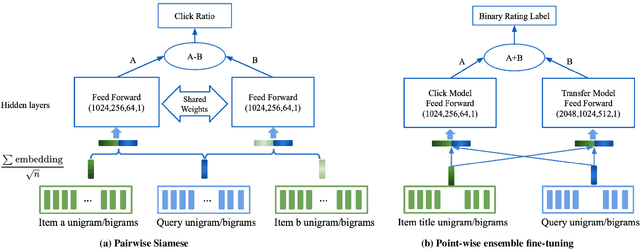



Abstract:Result relevance scoring is critical to e-commerce search user experience. Traditional information retrieval methods focus on keyword matching and hand-crafted or counting-based numeric features, with limited understanding of item semantic relevance. We describe a highly-scalable feed-forward neural model to provide relevance score for (query, item) pairs, using only user query and item title as features, and both user click feedback as well as limited human ratings as labels. Several general enhancements were applied to further optimize eval/test metrics, including Siamese pairwise architecture, random batch negative co-training, and point-wise fine-tuning. We found significant improvement over GBDT baseline as well as several off-the-shelf deep-learning baselines on an independently constructed ratings dataset. The GBDT model relies on 10 times more features. We also present metrics for select subset combinations of techniques mentioned above.
* 6 pages
From Semantic Retrieval to Pairwise Ranking: Applying Deep Learning in E-commerce Search
Mar 24, 2021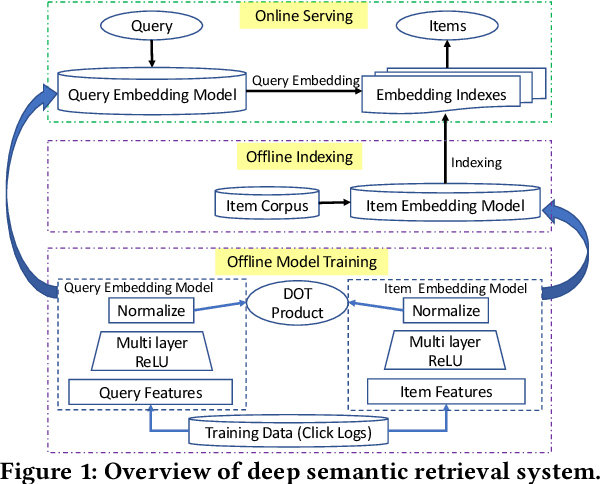

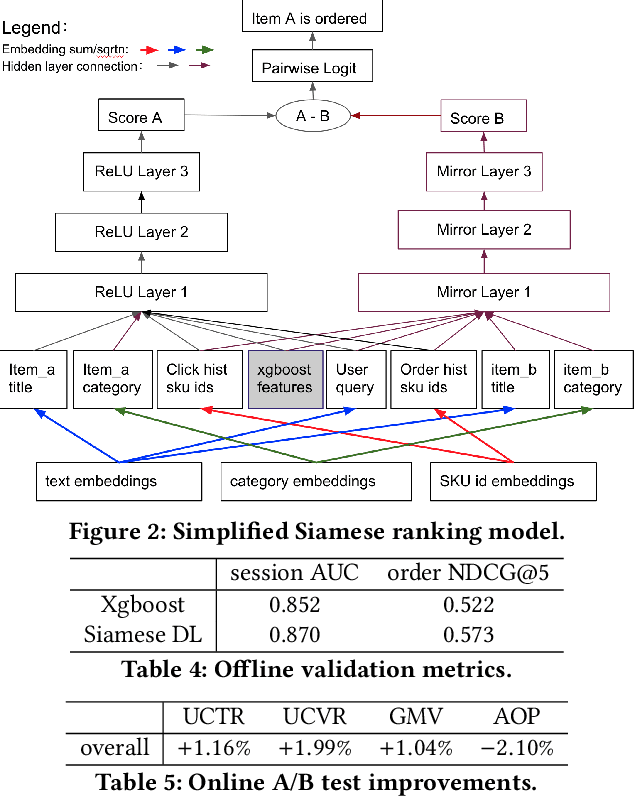
Abstract:We introduce deep learning models to the two most important stages in product search at JD.com, one of the largest e-commerce platforms in the world. Specifically, we outline the design of a deep learning system that retrieves semantically relevant items to a query within milliseconds, and a pairwise deep re-ranking system, which learns subtle user preferences. Compared to traditional search systems, the proposed approaches are better at semantic retrieval and personalized ranking, achieving significant improvements.
 Add to Chrome
Add to Chrome Add to Firefox
Add to Firefox Add to Edge
Add to Edge